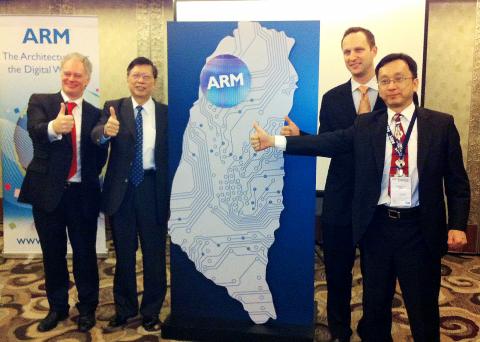ARM Holdings PLC, the UK chip designer whose chip designs are used in iPhones and iPads, yesterday announced the opening of an ARM Design Center in Hsinchu in northern Taiwan to support the company’s advanced processors, graphics and intellectual patents.
The Cambridge-based company designs chips and develops intellectual patents that are licensed to other companies to design and manufacture their own chips.
Apple Inc is on a long list of ARM technology licensees. The processors used in iPhones and iPads are based on ARM’s technologies, and are manufactured in Samsung Electronics Co’s factories.

Photo: CNA
ARM yesterday said in a statement the latest move reinforced the importance of Taiwan and the Asia-Pacific region to the UK company.
More than half of the 7 billion ARM-based chips shipped over the past 12 months were made in Taiwan, ARM president Tudor Brown said in a media briefing in Taipei yesterday.
The design center, ARM’s 11th overseas, has an initial operating capital of NT$50 million (US$1.7 million), according to information from the Hsinchu Science Park administration. The Hsinchu design center is the third of its kind for ARM in Asia, after centers in Shanghai and India.
“The goal of this design center, like others ARM does, is to add a catalyst to our partners,” Brown said.
The focus of this design center was on advanced system on chips (SOC) implementations based on ARM’s Physical IP, processors and graphics solutions, he added.
Brown said he expected the first product built with the company’s highest performance Cortex-A15 chips would hit the market by the end of next year and reach high volume in 2013.
Last month, Taiwan Semiconductor Manufacturing Co (台積電), the world’s biggest contract chipmaker, announced that it has “taped out” the Cortex-A15 from its factories using new 20--nanometer process technology. “Tape out” refers to the final stage of the chip design cycle before it is sent out for manufacturing.
ARM is planning to recruit six to eight staff members for the design center, with half of them local hires. The company is expected to double that number in next few years, ARM Physical IP Division vice president John Heinlein said, adding that the center would focusing on processors made on advanced 28-nanometer and 20-nanometer process technologies.
United Microelectronics Corp (聯電) is also a local partner of the UK chip desinger.
To keep up with strong demand for its technologies, ARM planned to spend US$200 million on research and development this year, higher than the US$150 million spent last year, Brown said.
Last year, ARM seized 28 percent of 22 billion units of SOCs shipped worldwide. Brown expected the company would outgrow the industry as a whole, which is expected to expand about 55 percent to 34 billion units of SOCs in 2015.
Commenting on the competition with Intel Corp in the ultrabook field, a new notebook category, Brown said he agreed that the ultrabook was what people wanted, but he disagreed that people wanted Intel processors inside them.
"I honestly think that the form factor of ultrabook is ideally suited to ARM technology," Brown said.
Taking netbook computer as an example, Brown said "the trouble was people wanted it [running on Windows]. As we look to the future very soon, we'll see ultrabook form factor with Widnows [and] with ARM technology."

SETBACK: Apple’s India iPhone push has been disrupted after Foxconn recalled hundreds of Chinese engineers, amid Beijing’s attempts to curb tech transfers Apple Inc assembly partner Hon Hai Precision Industry Co (鴻海精密), also known internationally as Foxconn Technology Group (富士康科技集團), has recalled about 300 Chinese engineers from a factory in India, the latest setback for the iPhone maker’s push to rapidly expand in the country. The extraction of Chinese workers from the factory of Yuzhan Technology (India) Private Ltd, a Hon Hai component unit, in southern Tamil Nadu state, is the second such move in a few months. The company has started flying in Taiwanese engineers to replace staff leaving, people familiar with the matter said, asking not to be named, as the

The prices of gasoline and diesel at domestic fuel stations are to rise NT$0.1 and NT$0.4 per liter this week respectively, after international crude oil prices rose last week, CPC Corp, Taiwan (台灣中油) and Formosa Petrochemical Corp (台塑石化) announced yesterday. Effective today, gasoline prices at CPC and Formosa stations are to rise to NT$27.3, NT$28.8 and NT$30.8 per liter for 92, 95 and 98-octane unleaded gasoline respectively, the companies said in separate statements. The price of premium diesel is to rise to NT$26.2 per liter at CPC stations and NT$26 at Formosa pumps, they said. The announcements came after international crude oil prices

SinoPac Financial Holdings Co (永豐金控) is weighing whether to add a life insurance business to its portfolio, but would tread cautiously after completing three acquisitions in quick succession, president Stanley Chu (朱士廷) said yesterday. “We are carefully considering whether life insurance should play a role in SinoPac’s business map,” Chu told reporters ahead of an earnings conference. “Our priority is to ensure the success of the deals we have already made, even though we are tracking some possible targets.” Local media have reported that Mercuries Life Insurance Co (三商美邦人壽), which is seeking buyers amid financial strains, has invited three financial

CAUTION: Right now, artificial intelligence runs on faith, not productivity and eventually, the risk of a bubble will emerge,’ TIER economist Gordon Sun said Taiwanese manufacturers turned more optimistic last month, ending a five-month streak of declining sentiment as concerns over US tariffs, currency volatility and China’s overcapacity began to ease, the Taiwan Institute of Economic Research (TIER) said yesterday. The manufacturing business confidence index rose 1.17 points from June to 86.8, its first rebound since February. TIER economist Gordon Sun (孫明德) attributed the uptick to fading trade uncertainties, a steadier New Taiwan dollar and reduced competitive pressure from Chinese producers. Taiwan’s semiconductor industry is unlikely to face significant damage from Washington’s ongoing probe into semiconductors, given the US’ reliance on Taiwanese chips to power artificial